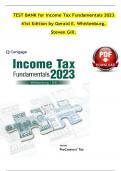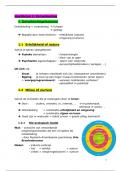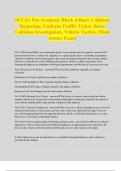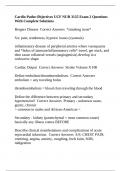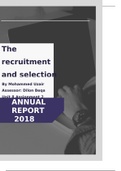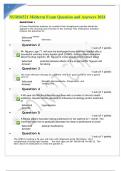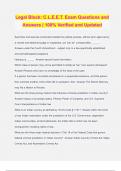SOLICITORS’ ACCOUNTS
KEY TERMS
Client cash/ A bookkeeping account that indicates the contents of an actual, physical bank account. Client money kept here remains
account entirely separate from business money. Solicitors are required to record transactions involving client money in this account
unless the only money held on behalf of a client is in respect of solicitors’ fees and disbursements received prior to a bill being
submitted and the solicitor does not otherwise maintain a client account and the client is informed where and how the money
is held
Client money Money held or received relating to regulated services delivered to a client or money received or held by you (a solicitor) on
behalf of a third party in relation to regulated services delivered, or held as a trustee, or held in respect of your fees and
disbursements (SRA Accounts Rules 2.1)
Disbursements Costs paid to a third party by the solicitor on behalf of the client. The client is expected to reimburse the solicitor for these
costs. For example, the Land Registry charges registration fees to solicitors who register property on behalf of clients. Solicitors
might pay the cost upfront and then bill their clients for it (although they will generally ask to be put in funds first – either way,
it will show as a disbursement in accounts)
Ledger An accounting tool used to keep a record of to whom money belongs. A ledger does not usually represent a real bank
account. For example, a solicitor will need to keep a client ledger for each individual client but will keep all of the monies
belonging to all clients in one client bank account. The client ledgers help the solicitor keep track of the money in the general
client bank account by stating how much is held for each particular client
Office cash/ A bookkeeping account that indicates the contents of an actual, physical bank account. Transactions involving the firm’s own
account money are recorded here. The business account is essential to ensure that business money is kept separate from client money.
Office money Money that belongs to the firm of solicitors
Petty cash A small amount of cash which is used to pay for minor cash expenditure
Profit costs Costs charged to the client in respect of the price that the solicitor charges for the work done for that client. The solicitor’s
fees for acting
The SRA Rules established by the SRA to regulate the way in which solicitors deal with money held for clients. All references in this
Accounts Rules chapter are to the SRA Accounts Rules, unless otherwise stated
VAT Value Added Tax: a tax levied by Her Majesty’s Revenue and Customs (‘HMRC’) on particular goods or services in the UK
THE RULES
Part 1
Rule 1 1.1 Who
Rules apply to authorised bodies, their managers, and employees
1.2 Responsibility
The authorised body’s managers are jointly and severally responsible for compliance
1.3 Licensed body
Rules apply only in respect of activities regulated by the SRA
Part 2
Rule 2 2.1 Client money
“Client money” is money held or received by the firm:
(a) Relating to regulated services delivered by [the firm] to a client;
o E.g., holding a court fee, money for a property search
(b) On behalf of a third party in relation to regulated services delivered by [the firm] (such as money held as agent,
stakeholder or held to the sender’s order);
o E.g., deposit for a property purchase
(c) As a trustee or as the holder of a specified office or appointment, such as donee of a power of attorney, Court
of Protection deputy or trustee of an occupational pension scheme;
(d) In respect of your fees and any unpaid disbursements if held or received prior to delivery of a bill for the same
o Fees defined in Glossary: your own charges or profit costs and that includes any VAT thereon
o Disbursements defined in Glossary: cost expenses paid or to be paid to third party on behalf of the
client or trust including any VAT element, but doesn’t include office expenses (e.g., postage fees) as
they’re covered by fees
2.3 Prompt payment
Client money has to be paid promptly into a client account
2.4 On demand
Ensure client money is available on demand, unless alternative arrangement agreed in writing with the client, or the third
party for whom the money is held
2.5 No proper reason to hold funds
Ensure that client money is returned promptly to the client, or the third party for whom the money is held, as soon as
there is no longer any proper reason to hold those funds
Rule 3 3.1 Bank accounts
Firms must have two bank accounts
• “Office account” – money belonging to the firm
• “Client account” – money belonging to the clients
o Must be at a branch of bank or building society in E+W, has to include the name of the firm and
must include the name ‘client’ to distinguish the bank account
3.3 Banking facilities
Solicitors should not use a client account to provide banking facilities to clients or third parties
hcnotes
, Payments into/Transfers from/Withdrawals from a client account must be in respect of the delivery by the solicitor/law
firm of regulated services
Rule 4 4.1 Separate money
The firm has to keep “client money separate from money belonging to” the firm
4.2 Prompt allocation – mixed payments
A firm must ensure it allocates promptly any funds from mixed payments [it receives] to the correct client account or
business [i.e., office] account
4.3 Payment of costs
Where you are holding client money and some or all will be used to pay your costs:
(a) must give a bill of costs, or other written notification of costs, to the client or paying party
(b) must be done before you transfer any client money from a client account to make the payment
(c) must be for the specific sum identified in the bill of costs and covered by the amount held for the particular
client or third party
Rule 5 5.1 Withdrawing from client account
Client money may only be withdrawn from the client account when it is:
(a) for the purpose for which it is being held
o E.g., money from client account can be used to pay a court fee on behalf of that client
(b) following receipt of instructions from the client
o E.g., holding money for the deposit for the purchase of a property and are given instructions by the
client to send the deposit to the seller’s solicitors
(c) on the SRA’s prior written authorisation or in [SRA] prescribed circumstances
o Only prescribed circumstance: withdraw residual client account balances of less than £500 on any
one client matter provided the balance is paid to a charity of the law firm’s choice and the law firm
has met the conditions set out (inclu. taking reasonable steps to find the rightful owner and
recording those steps)
5.2 Authorise and supervise
You appropriately authorise and supervise all withdrawals made from a client account
5.3 Sufficient funds
The firm can only withdraw client money from a client account if sufficient funds are held on behalf of that specific
client or third party to make the payment
Rule 6 6.1 Breaches
Duty to correct breaches of these rules promptly upon discovery and any money improperly held or withdrawn from a
client account immediately paid into the account or replaced as appropriate
Rule 7 7.1 Interest
You account to clients or third parties for a fair sum of interest on any client money held by you on their behalf
7.2 Different arrangement
Must be by written agreement with the client or third party and must provide them with sufficient information to
enable them to give informed consent
Rule 8 8.1 Accurate, contemporaneous, and chronological records
8.2 Statements
Obtain bank/building society statements at least every 5 weeks
8.3 Reconciliations
Carry out reconciliations between the bank/building society statements and the firm’s own records at least every 5
weeks
8.4 Central record
Keep readily accessible a central record of all bills or other written notification of costs given by you
Part 3
Rule 9 9.1 Operation of joint accounts
If you hold or receive money jointly with the client or a third party, Part 2 of these rules does not apply save for rule 8.2
and 8.4
Rule 10 10.1 Operation of client’s own account
If you operate a client’s own account as signatory, Part 2 of these rules does not apply save for rule 8.2, 8.3 and 8.4
11.2 Regular statements
You obtain regular statement from the provider of third party managed account and ensure that these accurately
reflect all transactions on the account
Part 4
Rule 12 Accountants’ Reports
Rule 13 Record-keeping
DOUBLE ENTRY BOOKKEEPING
Rules ü A pair of entries is required for every transaction
ü In each pair, one entry must be a CR (credit) entry and the other must be a DR (debit) entry
ü Both entries in a pair will remain on the same side of the ledger, i.e., both entries will take place on the office side or
both on the client side – ‘equal and opposite’
hcnotes
, How to write 1. Date – write the date the transaction took place
an entry 2. Details – in two parts: a) name of the ledger in which the corresponding entry is; and b) description of the
transaction
3. CR or DR – write the sum of money being credited or debited to the account
4. Balance – write the new balance on the account following the transaction and whether the balance is CR or DR
ACCOUNTING FOR PROPERTY TRANSACTIONS
Buyer Step 1: Receiving deposit from the buyer
Step 2: Sending the deposit to the seller’s solicitor upon exchange
Step 3: Receiving the mortgage funds from the lender
Step 4: Costs charged to the buyer-client
Step 5: Costs charged to the lender-client
Step 6: Receive completion funds from the buyer
Step 7: Payment of the purchase price to the seller’s solicitor upon completion
Step 8: Settling the bill
Seller Step 1: Receiving the deposit from the buyer’s solicitor upon exchange
Step 2: Costs charged to the lender-client and seller-client
Step 3: Receiving the purchase price from the buyer’s solicitors upon completion
Step 4: Redeeming the seller’s mortgage
Step 5: Settling your bill
Step 6: Paying the remainder of the purchase monies to the seller
DISHONOURED CHEQUES
Definition When a cheque “bounces” when the solicitor attempts to cash it at the bank
Issue If the solicitor has paid for disbursements out of the client account in the belief that the cheque would clear, then money will
have been paid improperly out of the client account
Rule 6.1 Solicitor must correct the breach of the rules promptly on discovery – solicitor must immediately transfer business money
across to the client ledger to bring the balance back up to zero
ACCOUNTING FOR VAT
VAT-registered Most firms are VAT-registered, so must charge VAT on the supply of legal services to their clients and account to HMRC for
amounts charged
A record must be kept of all VAT paid by the firm, and of all VAT charged by the firm
How is VAT VAT is recorded in the VAT account (takes the place of ‘office cash’)
recorded?
• If you are charging VAT, you will credit the VAT account
• If you are paying VAT, you will debit it
When is VAT VAT is chargeable at the point of supply – for solicitors, this is when an invoice is issued
charged? • A solicitor cannot charge VAT prior to or without issuing a VAT invoice
Supplies VAT-exempt supplies: VAT-chargeable supplies:
• Court fees • Expert witness fees
• Stamp Duty Land Tax • Counsel fees
• Land Registry searches • Surveyor fees
• Central Land Charges Searches • Estate agent fees
• Insurance • Photocopying
• Property, land, and buildings • Coal Mining searches
• Local Authority searches
Agency • Most common – estate agent and surveyor fees
payments • Key indicators: addressed to the client or ‘on behalf of’
• Always taken out of client ledger
• Always VAT inclusive figure
Principal • Always taken out of office ledger
payments • Got to split VAT from the net figure
• VAT debt is placed in the VAT account
• Remember to pick up the different VAT amounts owed if need to raise the bill in a later transaction in the exam
ACCOUNTING FOR INTEREST
SRA Rules Rule 7.1 and Rule 7.2
Fair sum Interest paid must be a ‘fair sum’
TIPS:
• Disbursements come out of client account always, unless stated out of office account or VATable and a principal
payment
• Check that the completion date on the FS is correct
hcnotes



